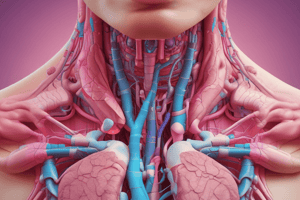Podcast
Questions and Answers
What is a significant interaction that may occur with hyperthyroidism medications?
What is a significant interaction that may occur with hyperthyroidism medications?
- Reduces the effect of lithium
- Reduces the effect of warfarin
- Enhances the effect of warfarin (correct)
- Enhances the effect of digoxin
How should hyperthyroidism medication be taken for optimal effectiveness?
How should hyperthyroidism medication be taken for optimal effectiveness?
- With food twice a day
- Before breakfast as a single daily dose (correct)
- As needed, depending on symptoms
- In combination with lithium
What monitoring is essential for patients on replacement therapy for hyperthyroidism?
What monitoring is essential for patients on replacement therapy for hyperthyroidism?
- Heart rate monitoring
- Regular cholesterol levels
- Thyroid function tests (correct)
- Blood sugar levels
Which of the following is NOT mentioned as a caution when administering hyperthyroidism medications?
Which of the following is NOT mentioned as a caution when administering hyperthyroidism medications?
What is a key patient instruction regarding the therapy for hyperthyroidism?
What is a key patient instruction regarding the therapy for hyperthyroidism?
What should patients be instructed to report while on hyperthyroidism medication?
What should patients be instructed to report while on hyperthyroidism medication?
Which disorder is primarily characterized by the immune system damaging the thyroid gland?
Which disorder is primarily characterized by the immune system damaging the thyroid gland?
Which of the following is NOT a common symptom of hypothyroidism?
Which of the following is NOT a common symptom of hypothyroidism?
Advanced hypothyroidism may lead to cognitive changes that resemble which condition?
Advanced hypothyroidism may lead to cognitive changes that resemble which condition?
What is a potential severe complication of advanced hypothyroidism?
What is a potential severe complication of advanced hypothyroidism?
Which sign may indicate that a person is suffering from advanced hypothyroidism?
Which sign may indicate that a person is suffering from advanced hypothyroidism?
Which type of hypothyroidism is specifically due to a dysfunction of the thyroid gland?
Which type of hypothyroidism is specifically due to a dysfunction of the thyroid gland?
What symptom may be reported by females suffering from hypothyroidism?
What symptom may be reported by females suffering from hypothyroidism?
Which of the following is a typical physical characteristic associated with hypothyroidism?
Which of the following is a typical physical characteristic associated with hypothyroidism?
A person with hypothyroidism may often feel which sensation even in warm environments?
A person with hypothyroidism may often feel which sensation even in warm environments?
What is the primary cause of cold intolerance in hypothyroidism?
What is the primary cause of cold intolerance in hypothyroidism?
Which drug is used for the treatment of hypothyroidism?
Which drug is used for the treatment of hypothyroidism?
What is the typical onset time for thyroid hormone medications like Levothyroxine?
What is the typical onset time for thyroid hormone medications like Levothyroxine?
Why must dosages of Levothyroxine be titrated in elderly patients?
Why must dosages of Levothyroxine be titrated in elderly patients?
Which symptom is NOT associated with hypothyroidism?
Which symptom is NOT associated with hypothyroidism?
What is the half-life of Levothyroxine?
What is the half-life of Levothyroxine?
Which of the following is a common side effect of overdosing on Levothyroxine?
Which of the following is a common side effect of overdosing on Levothyroxine?
Why is clinical response prioritized over blood hormone levels in dosage adjustments?
Why is clinical response prioritized over blood hormone levels in dosage adjustments?
What effect does hypothyroidism have on the metabolic rate?
What effect does hypothyroidism have on the metabolic rate?
Which symptom is common in patients with hypothyroidism due to low TH levels?
Which symptom is common in patients with hypothyroidism due to low TH levels?
Flashcards are hidden until you start studying
Study Notes
Hypothyroidism
- Hypothyroidism is a condition where the thyroid gland doesn't produce enough thyroid hormone (TH).
- Causes include:
- Hashimoto's disease: autoimmune disorder where the immune system attacks the thyroid
- Primary hypothyroidism: dysfunction of the thyroid gland itself
- Central hypothyroidism: failure of the pituitary gland, hypothalamus, or both
Signs and Symptoms
- Extreme fatigue
- Hair loss
- Fragile and brittle nails
- Numbness and tingling in the fingers
- Husky voice
- Menstrual disturbances: menorrhagia or amenorrhea in females
- Loss of libido
- Lowered body temperature and pulse rate
- Weight gain without increased food intake
- Thickened skin
- Thinning hair
- Mask-like facial expression
- Cold intolerance even in warm environments
- Slowed thought processes
- Slow speech
- Enlarged tongue
- Increased size of hands and feet
- Deafness
- Constipation
- Personality and cognitive changes resembling dementia
- Inadequate ventilation and sleep apnea
- Pleural effusion
- Respiratory muscle weakness
Progression
- Lack of TH decreases the metabolic rate.
Outcomes
- Cold intolerance: decreased metabolic rate leads to decreased heat production.
- Bradycardia: decreased metabolic rate slows heart rate.
- Weight gain: decreased metabolic rate reduces energy expenditure, leading to weight gain even with normal food intake.
- Depression: hypothyroidism is linked to imbalances in neurotransmitters associated with mood.
- Fatigue: decreased metabolic rate reduces energy production, causing fatigue.
Treatment
- Replacement therapy with synthetic L-thyroxine (Levothyroxine) is the standard treatment.
- Levothyroxine is available in oral preparations.
- Start with a low dose and titrate slowly, especially in elderly patients.
- Clinical response is more important than blood hormone levels when adjusting dosages.
- Levothyroxine has a slow onset of action, a long duration of action, and a half-life of 6-7 days.
- General side effects: usually associated with overdosage and include: nervousness, tremor, sweating, flushing, headache, poor concentration, tachypnoea, tachycardia, palpitations, muscle cramps, vomiting, diarrhea (symptoms of hyperthyroidism).
- General interactions:
- May enhance the clinical effect of warfarin
- May reduce the effect of digoxin
- May affect the response to oral diabetic agents
- Caution when given with lithium, NSAIDs, and corticosteroids
Nursing considerations
- May take several weeks for therapy to be effective.
- Take on an empty stomach once daily, preferably at the same time.
- Lifelong therapy is often required.
- Monitor thyroid function tests regularly.
- Patients should report any signs and symptoms of overdose.
Studying That Suits You
Use AI to generate personalized quizzes and flashcards to suit your learning preferences.



